Open to the public/RSVP requested
Click here to RSVP
The Public Art/Housing Publics: Conversations on Art and Social Justice symposium will explore innovative collaborations across cultural and social justice sectors. How can we sustain affordable housing and healthy neighborhoods in our communities? How can we sustain a thriving artistic life for our citizens? Most importantly, how can we answer both of these questions together? Timed to coincide with the residency of UC-Berkeley Regents Lecturer, Rick Lowe* of Project Row Houses, participants will include artists, scholars, civic organizers, and affordable housing developers from around the Bay Area.
Schedule:
1pm: Introduction with Shannon Jackson, ARC Director
1:15-3:15pm: Taking Ownership: Grass-Roots Place-Based Art, Housing, and Community Development
Featuring: Elena Serrano, Executive Director, Eastside Arts Alliance; and Eastside Cultural Center partners; Aubra Levine, Senior Project Manager, Satellite Affordable Housing Associates (SAHA); Andrea Papanastassiou, Northern California Community Loan Fund. Rick Lowe will act as respondent.
What does it take for a neighborhood-based arts organization to secure its future? Does owning your own building help? What kind of partnerships and cross-sector communication does non-profit real estate development require? What is the connection between housing and art? What does place-based creativity mean, and how does ownership in the broadest sense relate to authenticity? The partners who created the Eastside Cultural Center will discuss the development of the original center, which includes space for community arts creation and 16 units of affordable housing, and their current plans to build more units as well as expand arts programming.
3:30-5:30pm: Artists Working Across Sectors: New Knowledges and Scales of Practice
Featuring: Walter J. Hood, UC Berkeley Professor of Landscape Architecture & Environmental Planning and Urban Design, Jordan Simmons, Artistic Director, East Bay Center for the Performing Arts; and Raquel Gutierrez, YBCA In Community Program Manager, Yerba Buena Center for the Arts, among others. Rick Lowe will act as respondent.
This session explores the new knowledges, techniques, and vocabularies that social justice artists have acquired to depend and to extend their practice. Panelists discuss the obstacles and opportunities for imagining their work at different scales; considering issues of immigration, gentrification, urban planning, cultural policy, land rights, and environmentalism, they discuss their personal and collective strategies for working across sectors.
5:30-6:00pm: Closing Remarks
Note: Symposium participants are welcome to attend the Museum’s L@TE event, though a paid admission is required.
Public Art/Housing Publics: Conversations on Art and Social Justice is co-sponsored by The Arts Research Center, the Global Urban Humanities Initiative, Berkeley Art Museum and Pacific Film Archive, and UC-Berkeley Regents Lecture series. Special thanks to Amanda Eicher and OPENrestaurant.
*Rick Lowe is an artist whose unconventional approach to community revitalization has transformed a long-neglected neighborhood in Houston into a visionary public art project that continues to evolve, two decades since its inception. Originally trained as a painter, Lowe shifted the focus of his artistic practice in the early 1990s in order to address more directly the pressing social, economic, and cultural needs of his community. With a group of fellow artists, he organized the purchase and restoration of a block and a half of derelict properties—twenty-two shotgun houses from the 1930s—in Houston’s predominantly African American Third Ward and turned them into Project Row Houses (PRH), an unusual amalgam of arts venue and community support center.
Since its founding in 1993, PRH has served as a vital anchor for what had been a fast-eroding neighborhood, providing arts education programs for youth, exhibition spaces and studio residencies for emerging and established artists, a residential mentorship program for young mothers, an organic gardening program, and an incubator for historically appropriate designs for low-income housing on land surrounding the original row houses. While inviting constant collaboration with local residents, artists, church groups, architects, and urban planners, Lowe continues to provide the guiding vision for PRH as he pursues his overarching goal of animating the assets of a place and the creativity of its people. He is not only bringing visibility and pride to the Third Ward by celebrating the beauty of its iconic shotgun houses; he is also changing the lives of many PRH program graduates and expanding the PRH campus to cover a six-block area in an effort to preserve the historic district’s character in the face of encroaching gentrification.
Lowe has initiated similarly arts-driven redevelopment projects in other cities, including the Watts House Project in Los Angeles, a post-Katrina rebuilding effort in New Orleans, and, most recently, a vibrant community market in a densely populated, immigrant neighborhood in North Dallas. Lowe’s pioneering “social sculptures” have inspired a generation of artists to explore more socially engaged forms of art-making in communities across the country.
Rick Lowe attended Columbus College and studied visual arts at Texas Southern University in Houston. He is currently the artist-in-residence at the Nasher Sculpture Center and a Mel King Community Fellow at the Massachusetts Institute of Technology, and his work has been exhibited at such national and international venues as Houston’s Contemporary Arts Museum and Museum of Fine Arts, the Museum of Contemporary Art, Los Angeles, the Gwangju Biennale in South Korea, and the Venice Architecture Biennale. His other community building projects have included the Arts Plan for the Seattle Public Library, the Borough Project for the Spoleto Festival in Charleston, South Carolina, and the Delray Beach Cultural Loop in Florida, among others.
